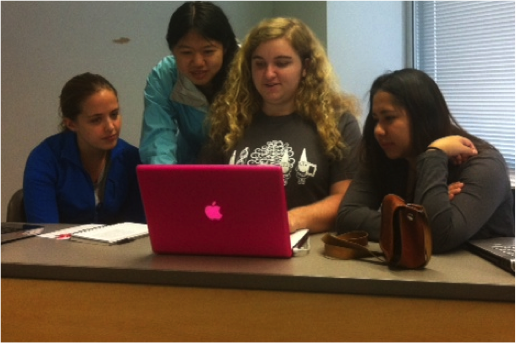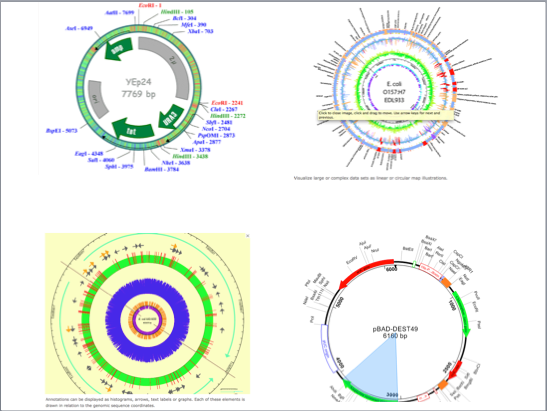Team:BU Wellesley Software/Notebook/SiruiNotebook
From 2011.igem.org
| Line 132: | Line 132: | ||
|- | |- | ||
| | | | ||
| - | [[File:KYLE_LAB. | + | [[File: KYLE_LAB.JPG |thumb|frame|center|upright|Observing the BU Wet lab team.]] |
*'''Summary''': Started designing widget; continued with wet-lab observations; devising a plan for BLAST visualization | *'''Summary''': Started designing widget; continued with wet-lab observations; devising a plan for BLAST visualization | ||
*'''6/13''': Continued looking at the features of Geneious and looking up related works. The circular chromosome design and the level of zoom in Geneious could potentially be interesting if we implement it in G-nome Surfer. Now G-nome Surfer is called '''G-nome Surfer Pro''' because we are now focusing on E. coli chromosomes. | *'''6/13''': Continued looking at the features of Geneious and looking up related works. The circular chromosome design and the level of zoom in Geneious could potentially be interesting if we implement it in G-nome Surfer. Now G-nome Surfer is called '''G-nome Surfer Pro''' because we are now focusing on E. coli chromosomes. | ||
Revision as of 03:44, 29 September 2011
Kathy's Notebook
Contents |
Timeline
Week of 5/31/2011 |
|
Summary BU/Wellesley Synthetic Biology Bootcamp
The comp team now has a good idea of what our goals are for the summer. Michelle and I will focus on observing the wet lab environment to see how a tangible user interface would potentially help research in a bioengineering lab. We may talk to more people later on in the summer about certain features to improve on G-nomeSurfer, and adjust our goals based on the needs of the wetlab. |
Week of 6/6/2011 |
|
Summary:End of training; beginning of Wet-Lab Observations and Background Research
|
Week of 6/12/2011 |
|
Week of 6/19/2011 |
from the meeting we learned about many information sharing tools used by the MIT iGEM team to manage information. The team used conferenceWIKI, Piazza, Stellar, Twitter, Geneious, AdGene, and PubMed extensively. Perhaps we could look into different social media and research tools being used by other teams as well. The team talked about having an assembly line for part creation the year before; while this emphasized parts creation, students were not able to acquire full skill sets, which is not the most educational approach to iGEM. Instead, the tasks this year are divided between everyone doing their own wiki and are responsible for their own parts, and a few students managing specific aspects, such as media relations or parts documentation. Suggestions from the MIT iGEM team on software to use: QR codes for documenting parts; having “glove-only” computers; perhaps even looking into a system that can be managed by gestures, and not by just touch; can a system be voice-activated? Having a videocamera system so that students can see what techniques were good, and if there were mistakes made, what to improve on in the future
Over the weekend: I need to do some background research on AutoCAD and GenoCAD, and find information on the company Ginko, which may help us pursue the QR code idea. Also, I need to do background research on GeneDesigner and see different existing designs for primer designers. Furthermore, I need to look into Spectacles, and see the important features of Spectacles. I need to start working on related works for a paper Orit is putting together! Also, need find out the size of tuberculosis plasmid backbones that may change how they are rendered on the widget.
Brainstorming on the LabBuddy/ electronic notebook system: where will it live? What will it do? Will it be an iPad/iPod/Android application? Can the notebook be monitored by the supervisor? Can students use it as a data-collector, or as a sketchpad? How will the information for the electronic notebook be organized? Talk about designs for PermuteTrumpet, Primer Design too! Need to read further on invertases… When it comes to gesture controls…. Kelsey and Consuelo are looking into Kinect. Can we create a primer design as intuitive as the Cambridge 2010 design? The BU team as split into teams, with Janoo on Puppetshow/Notebook, Craig on invertase/ Permute Trumpet design, Jenhan on a primer designer, and Chenkai on working with the wet lab in using the robot. Now we know who to contact if we have specific questions for each part!
Review protocol with Traci. We saw that each lab member presented their results and data to Traci individually, but there wasn’t a lot of group interaction involved. What if the electronic lab notebook had a conference sharing/ powerpoint presentation-typed feature that allow the entire lab to exchange data? That would be pretty cool! Wet lab observations at MIT. We interviewed iGEM members there about how the system works: how do they do background research on parts, how do people interact in the lab, what is the physical set up of the lab, and what they would want improved in their lab. The MIT team has a little more emphasis on presentation and research of background information before the division of labor even starts; can we design the tool to cater to their need for a strong database to get background research from?
Related work list NOW: update the powerpoint: more on Tinkercell, GenoCAD, AutoCAD, figure out GeneDesigner, ApE, SBOL, Spectacles try to think of a scenario for using the tool, and write section on related works. |
Week of 7/4/2011 |
|
Continue designing notebook application
Today the other half of the team presented in the Science Center CS Lecture Series. The first group presented last week Tuesday on inspirations and brainstorming ideas for the design process. This week, the lab presented on designs and future plans for beyond iGEM. We continued designing the LabBuddy/ electronic notebook application. Consuelo and I decided that instead of a checklist or a protocol list, a flowchart of some sort with annotations on the side could work, allotted that there is room for figures and the notes can be printed separately later. Something also to consider is a function that displays lab reminders from Traci, Suma, and James, a “training mode” in protocols, that could help prevent wet lab errors and increase productivity. Also, I did further background research on related works, either in the LabBuddy application or frequently-used tools in synthetic biology. There are a few tools that are already in use for note taking in an iPod or iPad setting, but they are not specifically for lab usage, and are fairly pricy.
Continue doing related works ppt and adding features 7/7-7/8:The research for related works continues still! Michelle and I are refining the scenario for presentation to the BU team. |
Week of 7/11/2011 |
|
Week of 7/18/2011 |
|
Week of 7/25/2011 |
|
Week of 8/1/2011 |
|
Week of 8/29/2011 |
|
Week of 9/5/2011 |
|
Week of 9/12/2011 |
|
Week of 9/19/2011 |
Wiki freeze on Wednesday! AAAHHH
|
Other Important Links:
External Links
[http://twitter.com/BU_Wellesley Follow BU_Wellesley IGEM Team on Twitter!]
[http://partsregistry.org/wiki/index.php/Main_Page Registry of Standard Biological Parts]
BU_Wellesley IGEM Lab Notebook
 "
"



